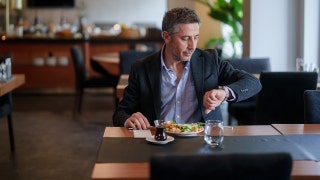How do Edible Arrangements stay fresh?
Fox Lifestyle: Edible Arrangements President Rob Price says Valentine's Day is the company's 'Super Bowl'
It’s nearly Valentine’s Day, and instead of chocolate, fruit on a stick (even if it's sometimes covered in chocolate) seems like a pretty good idea to some.
For Edible Arrangements, which is world's largest franchisor of shops offering designed fruit, it’s the company’s busiest time.
But keeping all that fruit yummy–and not runny—is a massive logistical feat.
The company’s president Rob Price came in to talk to us about some surprising things you probably don’t know about the company, its bouquets and its founder.
Tariq Farid started with a flower shop
After immigrating to the U.S. from Pakistan when he was 11, founder Tariq Farid’s parents opened a flower shop in East Haven, Connecticut, in which he worked. At 17, he started thinking about the presentation of food in different displays and found a niche by scaling out cut fruit into a larger retail business. He started the franchising company with his brother Kamran in 1999, which has grown to 1237 stores worldwide.
It’s their Super Bowl
The company is expected to fill 10.8 million orders in 2016. But the busiest time for them is Valentine’s Day. During the run up to the holiday, stores increase staff fivefold to construct bouquets, take orders and deliver the arrangements.
Most popular order is…
Sweetheart Swizzle Bouquet is fruit cut in fun shapes (think hearts) and then dipped in chocolate and swizzle design made with white chocolate. But we kind of like the Incredible Edible, a towering assembly of six types of fresh fruit weighing in at 65 lbs.
Keeping it fresh
The company doesn’t use dry ice, wax or preservatives to keep the fruit fresh. It stays cold and crisp because the arrangements are not made until a customer orders them and then they’re delivered in refrigerated trucks from from one of Edible Arrangements’ 1200-plus store locations.
It has a foundation
Founded in 2013, the Tariq Farid Foundation helps provide basic needs such as food and healthcare to people in the U.S. and overseas. The group has helped raise money for Syrian refugees living in the U.S. and supports a hospital in Pakistan --the Salma Khatoon-named after his mother –that provides free medicine and healthcare, mostly to women and children.









































